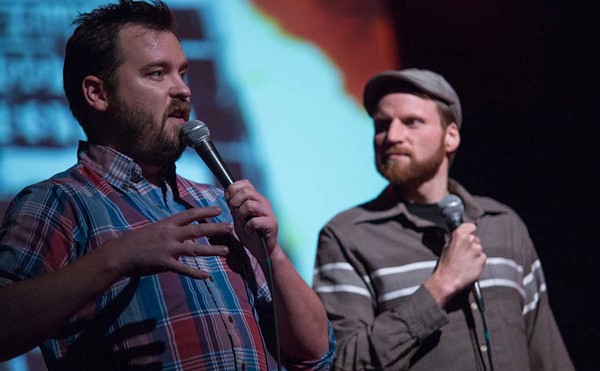Since editing is the established syntax of cinema, the long take will always seem anomalous, whether showy or subtle, at the service of the narrative’s mood or the director’s ego. It can create suspense, if only unconsciously, as we await the expected edit, or it can lull us with its lack of sudden disruptions. It almost always has a bravura aspect and has been best used by directors who have an instinctual disdain for clichés. Orson Welles’ opening for Touch of Evil (1957) is probably the most famous long take by dint of being that director’s most ostentatious, though there are others in that film that are almost its equal; he had perfected the long tracking shot as far back as The Stranger (1946).
For Welles, part of the appeal of the long take was the way it could put dialogue in a context that suggested the continual flow of a stage (or radio) play, while still having the unique visual quality intrinsic to film. For Hitchcock, on the other hand, the appeal was largely technical, a diverting problem for a director whose inventiveness often seemed a way of staving off the boredom of conventional storytelling. Which may explain why his two long-take experiments — Rope (1948), which was shot as a series of 12-minute takes, and Under Capricorn (1949), where the long take was used more judiciously — are technically clever but dramatically ho-hum.
The length of Hitchcock’s takes was determined by the length of a reel of film at that time, and his urge to transcend the current technology was evidenced by Rope’s use of hidden edits to give the impression that the piece consisted of an unbroken 80 minutes. But now, thanks to unstoppable progress, such subterfuge is no longer necessary and Russian director Alexander Sokurov, with Russian Ark, has made a film that consists of a single 96-minute take. The result is both impressive and puzzling.
With over seven months of preparation and over 800 actors and extras employed, the film is a technical marvel. But Sokurov (who had an early creative relationship with Tarkovsky and shares with that director a particularly Russian streak of mysticism) is less a storyteller than a creator of moods and suggestive anecdotes. So while we’re pulled along by Ark’s inexorable movement, the feeling of missing the point is a recurring concern.
The movie takes place in the Hermitage museum in St. Petersburg, which consists of four buildings, including the old Winter palace of the Tsars, and which houses more than 3 million objets d’art, from paintings and coins to sculptures and medals. At first our guide through the museum is a contemporary, disembodied voice (Sokurov’s) whose point of view is that of the camera. But soon he’s joined by an on-screen figure, a 19th century marquis and diplomat (Segey Dreiden) — apparently we’re not only going to travel through the museum but through time and not necessarily chronologically. The marquis is a representative of the French cultural hegemony that set the standard for Russia and Europe well into the 1800s. He views the various works on display — which come from several countries as well as Russia — with a critical eye that precludes neither enthusiasm nor dismissal. His tone of world-weary cosmopolitanism is a counterpoint to the invisible narrator’s more modern respectfulness toward things historical.
These personages from the past and modern-day tourists act as our dual guides as they carry on an often-cryptic dialogue — if a specific argument or position was being put forth, I didn’t pick it up. The movie only traverses a part of the huge museum, about a mile’s worth, going into the basement, outdoors into a small courtyard area, all with a choreographed grace that makes the unbroken mise-en-scène seem natural and not ostentatious. Until the grand climax in a ballroom with several hundred people, there are hardly any moments that inspire “ooohs” and “ahhhs.”
And it’s not until it’s over that the fact that it was all one take seem more than a little mind-bending.
Showing exclusively at the Detroit Film Theatre (inside the DIA, 5200 Woodward Ave., Detroit), Friday through Sunday. Call 313-833-3237.
Richard C. Walls writes about film and music for Metro Times. E-mail him at [email protected].





